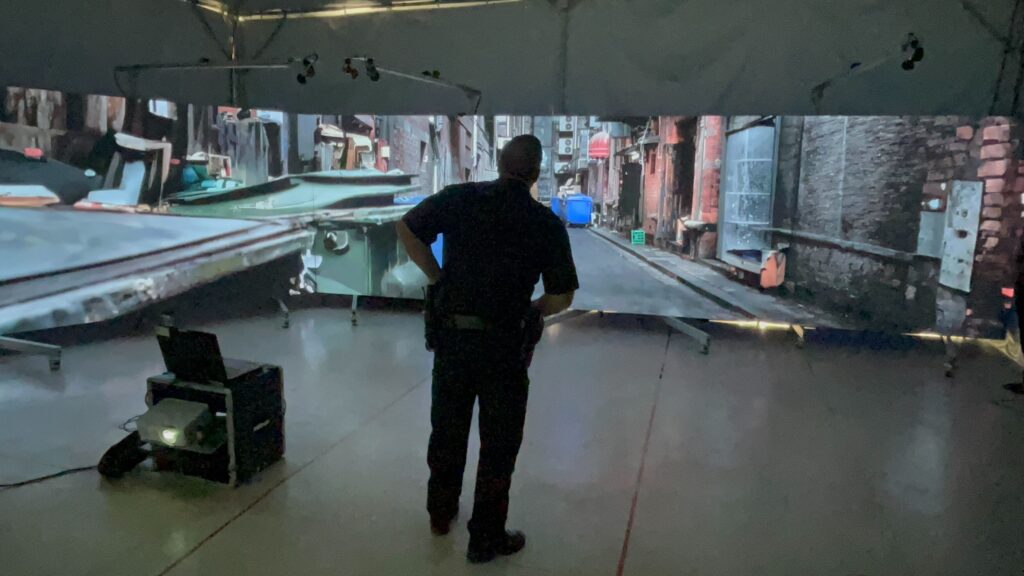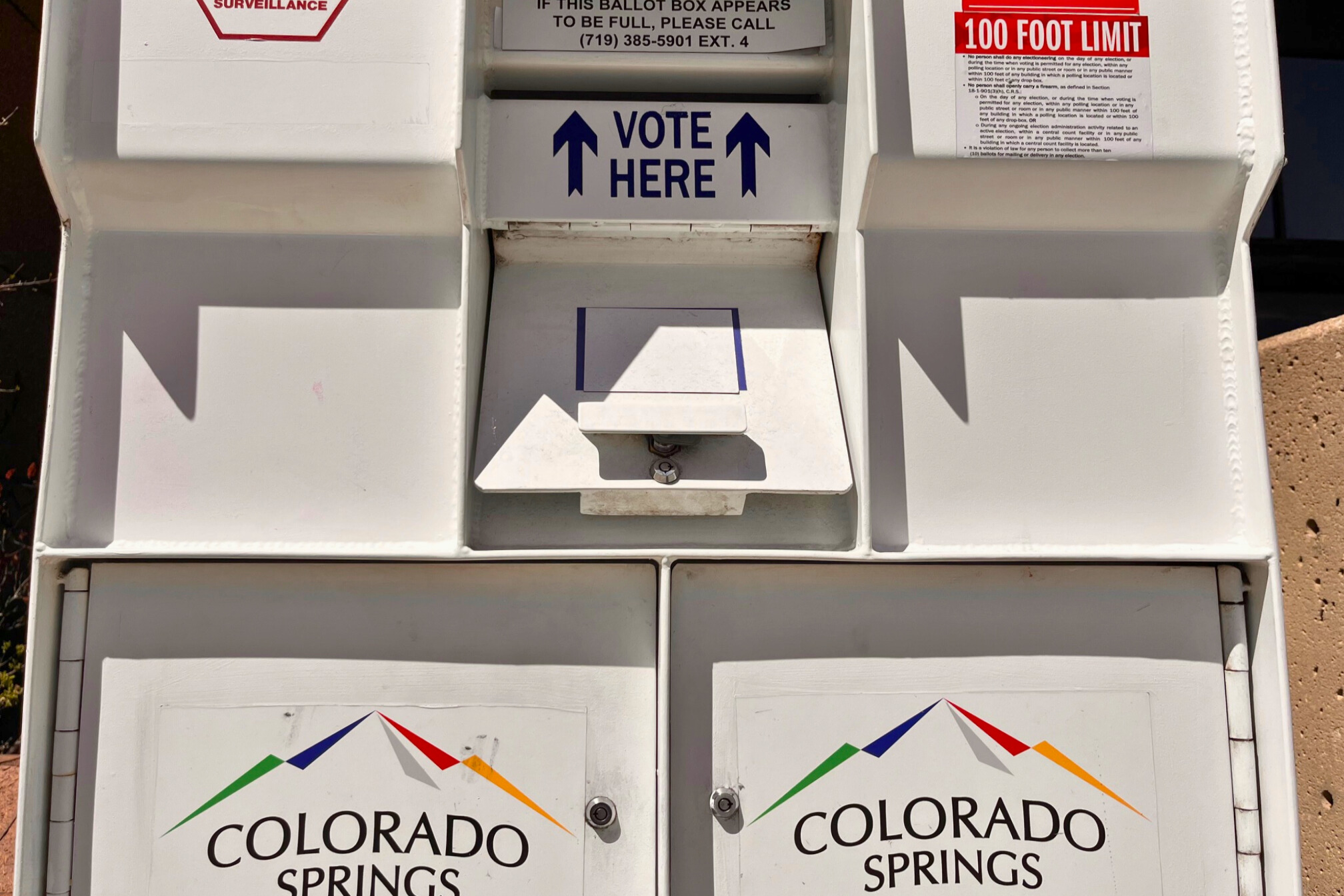
There’s $350 million of state funding on the table for law enforcement agencies in Colorado thanks to voters in 2024. As they confront issues with recruitment and retention, those agencies want to know how soon the money will start flowing and how it will be distributed.
State lawmakers laid out their plans during an open house hosted at the Denver Police Department’s Police Academy Wednesday. Representatives from State Patrol and other metro area departments were in attendance. State Sen. Barbara Kirkmeyer. A Republican who sits on the powerful Joint Budget Committee, attended, along with Republican Rep. Jarvis Caldwell and Democratic Rep. Chad Clifford.
“It's truly about not defunding the police, but actually defending and supporting our law enforcement agencies throughout the state,” Kirkmeyer said. “And making sure that we're not only supporting our law enforcement agencies, the work that you do for us, but also your families as well.”
During last year’s election, voters approved Proposition 130. It directs lawmakers to send an additional $350 million to local law enforcement agencies on top of existing grants and programs. The proposition created a one million dollar death benefit for families of officers killed while on duty.
Beyond that, the funds must go for:
- Increased pay
- Hiring, recruitment and retention bonuses
- Hiring additional officers to address specific geographic areas of types of crime
- Training on the use of force, restrain, and physical fitness
But the language of the proposition didn’t include specifics about how the money should be distributed, or how quickly lawmakers have to start sending it out.
Kirkmeyer said she anticipates that the $350 million will be distributed at $35 million a year over a decade, with a new committee made up of representatives from local governments and law enforcement overseeing how it’s spent.
She also made it clear that these will be direct disbursements, not grants, and that the money won’t supplant existing local and state funding for law enforcement.
“It really is truly to help you retain, recruit your law enforcement agencies and then have the ability to have the amount of funding that you need for training. So, that's what we're aiming for,” Kirkmeyer said.

The new law enforcement spending comes as lawmakers must find nearly $700 million worth of savings in the budget for the next fiscal year that starts on July 1. Clifford hopes they don’t have to cut anything, but acknowledged the state budget is out of balance right now.
“We're going to have to make cuts in lots of areas in order to make all of the budget work. And this is another piece of that,” Clifford said. “Something is getting cut somewhere, if not necessarily just specifically for this piece.”
Clifford, who has a background in law enforcement, opposed Prop. 130 when it was on the ballot; concerned it was fiscally irresponsible to commit the state to this spending. But, he also agrees with voters that the money is needed.
“Taking $350 million out of the state budget and putting it in a local government for something that we normally fund through local governments doesn't make a lot of sense,” Clifford said. At the same time, though, “we have had diminution in the ability to recruit and train law enforcement and almost every agency in the state you find some situation where they are understaffed or having trouble retaining officers.”
Nationally, law enforcement agencies have struggled with staffing in recent years. The Denver Police Department is authorized to employ up to 1639 officers. But in 2020, DPD saw a spike in attrition when 111 more officers than expected left the force. DPD Investigations Division Chief Rick Kyle cited numerous reasons for the unexpectedly high turnover.
“We had a large number of hires about 25 to 30 years ago, and people are coming to retirement age. It's a very challenging job. There's dangers to the job, there's risks, and it's very stressful,” Kyle said. “There were a lot of frustrations around that time. There was obviously the pandemic. There were a large number of protests and civil unrest that caused a lot more stress than we normally see, and it's a stressful job normally.”
DPD aims to be back at full strength by 2028. They expect more than 500 officers to leave over that time, an annual attrition rate of almost 8 percent. And so, they’ll need to hire 632 officers to achieve their staffing goal.
The Colorado State Patrol has a more difficult task as a statewide agency. Capt. Rocco Dominico of the CSP Academy said the funding would help address areas where it’s hard to recruit and retain troopers, a problem they have in both the rural parts of the state and areas with a high cost of living.
“We have a lot of areas within the state of Colorado that are a little bit more difficult to retain,” Dominco said. This funding “would help us to try to get some recruitment in some areas that are maybe a little bit more hard pressed.
Kirkmeyer said she’s pushing for Prop. 130 funding to be introduced as a Joint Budget Committee bill, with bipartisan sponsorship, since it deals with budgetary issues.
The death benefit requirement is already in effect. It began immediately after the passage of Prop. 130 on November 5. Families of fallen officers already received 70 percent of those officers’ salaries. Prop. 130 adds $1 million on top of that. Gov. Jared Polis recently called on state lawmakers to extend the benefit retroactively to include the family of Golden police officer Evan Dunn, who was killed by a drunk driver the day after the election.









